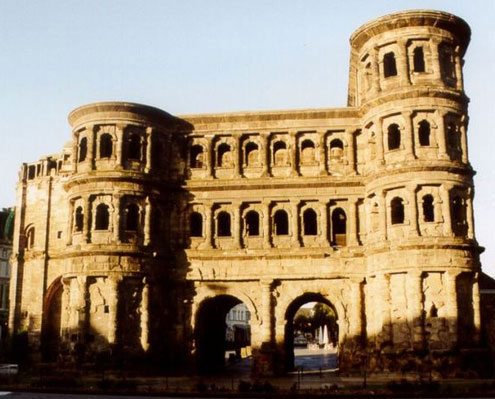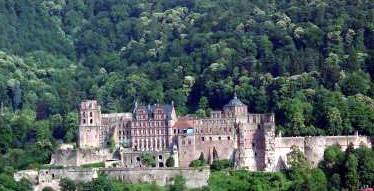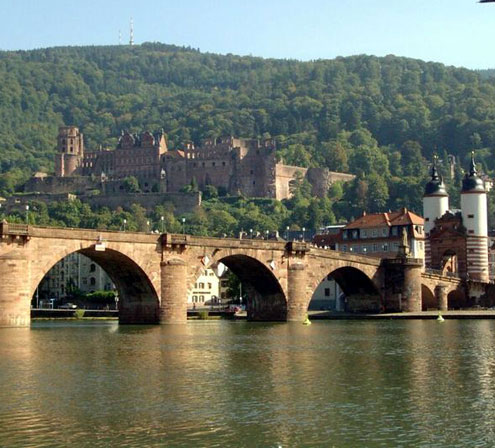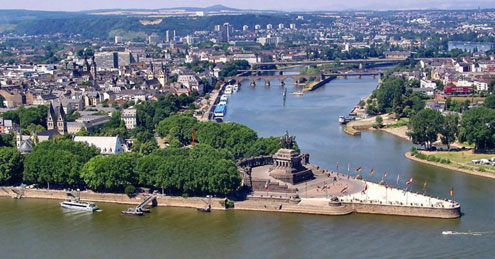Sometimes it only seems the grass is greener on the other side of the fence, but Harry Peyton Steger is on the other side of the big pond now and tramping across Europe is everything the Fannin County native had dreamed of...and more.
"You should see me now," Steger writes from Bonn, Germany to his parents in Bonham. "I have a traveler's pack. It slings across my shoulders and is wonderfully easy to carry. It contains: a small German dictionary; a toothbrush, a tube of powder, a bottle of listerine, four collars, six handkerchiefs, two shirts, suits of underclothes, three pairs of socks, my overcoat, a pipe, some tobacco--and, really it is very easy to carry. In the morning--September 4, 1905--Herr Kube (the German with whom I live) and I start for a tramp along the Mosel. Get an atlas and see how the Mosel River winds about. Its water length is four times--almost--as great as the direct distance from mouth to source. We go from here [Bonn] to Coblenz by rail--fifty miles. My ticket there costs me 20 cents and brings me back, too, a round-trip!"

For the first time in years, Harry doesn't feel restricted by limited finances. Around Bonham, the Steger family owned and operated several prominent enterprises, with the Steger Mill as the family flagship. Harry's father, Thomas P. Steger, seemed to be a highly regarded lawyer. As a matter of fact, one of the junior partners at Thurman & Steger Law Firm was a young lawyer named Sam Rayburn. But Harry was far from an entitled, trust-fund child that background might conjure up.
In Austin, he worked at the UT registrar's office and tutored first-year students to get by while some of the wealthier students made fun of his clothes. In Baltimore, during his year at Johns Hopkins, Steger worked first as a laundry mat nightwatchman and later he filled in at Baltimore City College when their Latin and Greek instructor became ill.
Now Harry was hauling in $1,500 a year as a Rhodes Scholar and, in the German economy, Steger calculated that amount would equal $5,000 per year. It was a land of fine two-cent cigars and a bottle of pure Rhein wine was 12 cents, however Steger's frugal upbringing made him relinquish funds sparingly. For example, train fare was so inexpensive because Harry often traveled fourth class where he would "stand up in the car with the rest of the human drove."
"None save a noble-bleeded personage, or perhaps a vulgarly rich person intent on display, goes first class," Steger remarked. "All the better class of Germans, all tourists, travel 'second'; except, for short distances, when men are alone, they travel 'third'; workmen, laborers, nurses and hired women travel 'fourth.' Transportation, for persons, is very cheap; for baggage, very dear."
Only two months after first setting foot in Germany, Harry seems perfectly at ease on a foot-tour of the Mosel River with Herr Kube, his non-English speaking host. It has been weeks since Steger has spoken his mother tongue.
"Of course, my German has an accent," Harry admits, "but I'm always taken for a Dane, a Norwegian or a Hollander, as the accent seems to tend in that direction. I have not spoken a single, solitary word of English, I have read nothing but German literature, papers, novels, everything, and, to the best of my mind, it has been the greatest lark of my lifetime."
The sights along the Mosel River that Steger took in must have made fascinating reading to his family in Fannin County. There were remnants of a medieval dungeon, complete with the bones of prisoners tossed in by the cruel old lords.
Trier, Germany fascinated Harry.
"There are old Roman baths, the old palace where the Roman Emperor Constantino lived at different times, old Roman streets still in use," Steger wrote to his parents. "The Roman bridge across the Mosel, even 'till today the bridge most used in that vicinity; the Trier city library, where old books, richly illustrated by hand, years and years before printing was known, books whose marvelously colored pictures still retain their brilliance and clearness; manuscripts, with signatures of Martin Luther, of Goethe, of Schiller, of Calvin. I studied hard in Trier, for I had my first opportunity there of seeing a really considerable mass of Roman antiquities. Trier, by the way, is, according to indisputable evidence, some 1,300 years older than Rome. The Porta Nigra, an entrance the Romans built about 50 A.D., still stands, an enormous gateway."

To old pal Edward Crane in Dallas, Steger writes, "Come over here for a glimpse of the only people in the world who know how to live without working, to eat without digesting, to drink without getting drunk. Day before yesterday I came in from a 10-day's tramp along the Mosel River; and my sole comrade was Herr Kube, a totally Englishless German with whom I live here in Bonn. To be sure, little Harry would hesitate, ere he entered into a discussion on The Immortality of the Soul, where German was the medium. The beautiful country along the Rhein I know very well; and the magnificent old castles have seen me plump 20th century presence; but the windings of the Mosel have been the most beautiful to me.

"The course of the river is so crooked that I have, after climbing a little mountain, seen the stream in all four directions; and, too, Eddard, there were seven little German villages in sight, nestling snugly in the winding valley. Heidelberg, too, was interesting. The old university, with its student-prison, made great sport for me."
Heidleberg University was established in 1386, although some of the buildings date back to 1200 A.D. Since his father practiced law, Steger found it particularly interesting to learn that no municipal policeman could arrest a student of a German university.
"Here in Germany, each university has its own courts of criminal and civil procedure and a student is subject to no other authority," Harry had relayed to his father in Bonham. "This necessitates a complete court apparatus, and, in such a scheme, a dungeon is necessary. The prison at Heidelberg is the most picturesque. It is considered a lark to be imprisoned there, for they are given whatever they wish to eat and drink, whatever service they are willing to pay for, anything to read, or games to play, that they order; and chums are, at their request, put into the same room. The walls of these rooms are ludicrous sights. Not a half-inch of space is free from painting in crude and gorgeous colors. Here is a caricature of some august and reverend university official. The cause of their duress vile, and a comically composed verse serve as the text; there is a sonnet, perhaps in German, perhaps in Latin (and even occasional English verse), which the poor (?) prisoner has used to give vent to the pangs of his burdened, tortured soul."
Of all the memorable places he visited, Harry wrote that the colossal castle at Heidelberg was the most interesting ruin in Germany.
Even the size of the oven was staggering. It was larger than Harry's father's law office and Harry's uncle Ed Steger's offices combined. Heidelberg Castle was also home to the world's largest wine barrel. The local subjects paid their taxes in wine, so the "petty princes" built a 50-thousand gallon wine barrel to hold their reward. And they say everything's bigger in Texas!
Construction at Heidelberg began late in the 11th century and even though it shows the ravages of time, man and nature, the mammoth, vine-covered structure built on a hillside still towers over the city.

"Nature knows how to garnish a ruin to get the best effect," Mark Twain wrote of Heidelburg Castle in A Tramp Abroad a mere 25 years before Steger's visit. "Misfortune has done for this old tower what it has done for the human character sometimes − improved it."
To see the area at its best, Twain believed it necessary to see Heidelberg embellished by the soft glow of gas lamps as evening falls.
"One thinks Heidelberg by day--with surroundings--is the last possibility of the beautiful," Twain admitted, "but when he sees Heidelberg by night--he requires time to consider upon the verdict."

On the other hand, Berncastle, Germany left Steger with a very different impression.
"Berncastle has the narrowest, dirtiest streets it has been my misfortune to tread," Harry remarks. "And, probably from a sense of harmony, the people are supremely dirty, too. There are tottering, rambling old houses of the 13th century that still hold together and are inhabited by tottering, dirty old folks that still hold together. There is a recently erected monument and I wanted to take a picture of it. And old veteran of 1871, in a gaudy uniform that had at intervals proof of too close contact with its wearer's beer and cheese, caught me in the act and excitedly told me that to take a picture of that monument was most strictly forbidden. He identified himself as the sentry stationed there. I asked him the whyness of his whatness. He replied that a firm which gets out these View-Postal Cards had bought from the German Government all photographic rights!"
So, some nuances of German life perplexed the transplanted Texan. Tomato soup was very common, Harry observed, but order a raw tomato in a hotel and the staff will gaze at you as if they just found out you are contemplating devouring one of your own race.
And Steger continued to wrestle with his emotions as he observed the rituals of the regionís dominant religion.
"Here on the Rhein," Steger wrote to P.C. Thurman, "almost everything is Catholic. I wrote Charlie something of a lot of holy bones that cured everything from fits to sore eyes. To see, in Cologne, that grand mass, that magnificent cathedral, with its hundreds of years of history and accumulation of treasures of art and gold, does not tend to make me a Romanist. Poor old market women, bowed double with work, with hands all hard and gnarled, toothless, wavering in step, come in and pray to the blood spots on the stone feet of Jesus, and to the Holy Mary most of all, for forgiveness, pay their money that represents the sap of their life, cross themselves, 'genuflect,' dabble their priest-blessed hands in holy water and go away believing that the stone image of Christ on the cross has helped them. Often on the streets here I come across a crucifix which, for economy's sake, shows only the feet and the hands of Jesus nailed through--a ghastly sight, for no other part of the body is there."
To be fair, Steger's reaction would probably have been no different than that of someone reared exclusively in Catholic services witnessing their first hellfire and brimstone brush arbor revival in Harry's hometown. The powerful emotions evoked in both scenarios would be difficult, if not impossible, for an outsider to comprehend.

And, as if penance for his doubt, Steger's fortune-telling skills seem to be fading.
He jokingly refers to his mom as "mither," probably an inside joke about the vernacular of the scholarly students Harry is now associating with, and Harry asks his mither to buy a post-card album for all the view-cards he is sending home.
"It has occurred to me that in later years it will interest me, too, to see the cards," Harry writes home.
Sadly, he is mistaken.
"The next letter you write me, after receiving this one, you had best address me at Balliol College, Oxford, England," Steger advises his parents. "That will be my permanent address for the next three years."
Wrong, again.
Previous Steger articles:
http://www.ntxe-news.com/artman/publish/article_86954.shtml
http://www.ntxe-news.com/artman/publish/article_86956.shtml
http://www.ntxe-news.com/artman/publish/article_86957.shtml
http://www.ntxe-news.com/artman/publish/article_86955.shtml
http://www.ntxe-news.com/artman/publish/article_86965.shtml
http://www.ntxe-news.com/artman/publish/article_87117.shtml
http://www.ntxe-news.com/artman/publish/article_87118.shtml
http://www.ntxe-news.com/artman/publish/article_87121.shtml
http://www.ntxe-news.com/artman/publish/article_87207.shtml